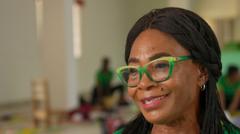In Nigeria, a mother's mission to combat neonatal jaundice and its role in causing cerebral palsy is gaining ground through her Cerebral Palsy Centre and initiatives like the Oscar Project, aiming to reduce stigmatization and improve treatment access for affected children.
Tackling Neonatal Jaundice: A Mother's Battle Against Cerebral Palsy in Nigeria

Tackling Neonatal Jaundice: A Mother's Battle Against Cerebral Palsy in Nigeria
One woman's dedication is paving the way for better care and awareness of neonatal jaundice and its impact on cerebral palsy in Nigeria.
In Nigeria, where an alarming number of babies are born with neonatal jaundice, the tragic consequences can lead to permanent disabilities like cerebral palsy. For 22-year-old Babatunde "Baba" Fashola, who has spent a decade at the Cerebral Palsy Centre in Lagos, life has been challenging; he is unable to walk or speak and relies on a feeding tube. He is one of many who face lifelong care due to a common yet treatable condition that is often neglected in Nigeria.
Nonye Nweke, the centre's founder, has devoted her life to provide support for Baba and other children facing similar struggles. Despite the lack of concrete data, studies suggest that around 700,000 individuals in Nigeria are affected by cerebral palsy, often exacerbated by untreated neonatal jaundice. According to Professor Chinyere Ezeaka from Lagos University Teaching Hospital, more than 60% of newborns experience jaundice, which is primarily caused by bilirubin build-up.
Fortunately, treatment is widely available and inexpensive, often involving exposure to ultraviolet light to break down excess bilirubin in a baby's blood. However, in Nigeria, immediate access to such care is rare, placing the country among the highest globally in neurological disorders related to jaundice.
Nweke, a single mother who established the Cerebral Palsy Centre after facing immense difficulties in finding proper care for her daughter Zimuzo, now 17, shared her experience of harsh stigmatization. This belief that children with disabilities are spiritually afflicted leads to abandonment and societal isolation, especially in rural areas.
The Oscar Project has recently launched in Lagos, aiming to combat this issue by equipping health facilities and training health workers to improve the early detection and treatment of neonatal jaundice. Coordinated by disability advocate Oscar Anderson, whose own experience with untreated jaundice resulted in cerebral palsy, the project seeks to reach 10,000 mothers and screen 9,000 children in its first year.
Though progress is slow in a nation where the public health system is overwhelmed and the government remains silent on the issue, Nweke’s vision and the Oscar Project's initiatives are creating hope for a future where babies can be protected from the life-altering effects of neonatal jaundice. As the community rallies together, both Nweke and Anderson believe the fight against misinformation and inadequate care for disabilities should persist until every child receives the necessary treatment.



















